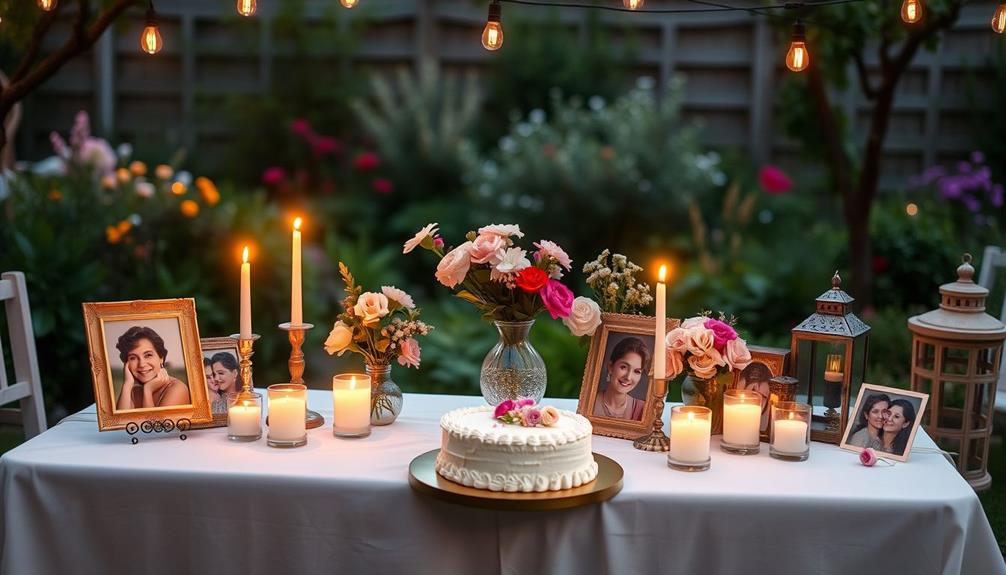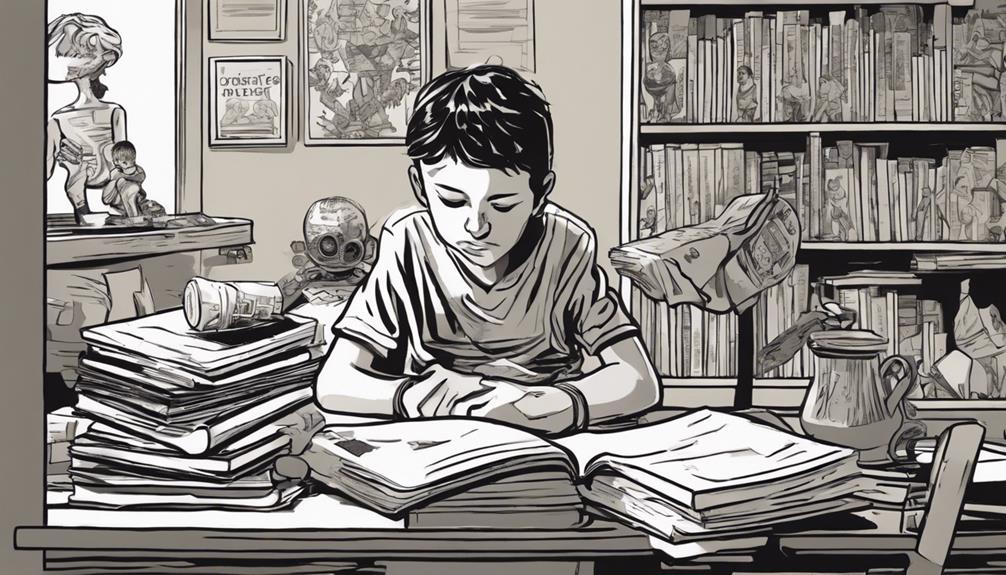Celebrating your mom's birthday after her loss can be incredibly challenging. It's important to acknowledge your feelings of grief while also cherishing her memory. You might try creating new traditions, like cooking her favorite meals or holding a candle-lighting ceremony. Engaging in activities she loved keeps her spirit alive. Remember to prioritize self-care and connect with family and friends for support. You can share stories or create a memory jar to honor her. Embracing these ideas can help you find balance during this emotional time, allowing for remembrance and healing as you navigate this bittersweet day together. There's much more to explore.
Key Takeaways
- Honor your mom's memory by cooking her favorite meals and inviting family to share stories and reminisce together.
- Create a memory jar filled with cherished memories to celebrate her life and foster connection with loved ones.
- Light a candle or release lanterns as a symbolic gesture of love and remembrance during the day.
- Engage in self-care activities, like journaling or mindfulness practices, to process emotions and promote emotional well-being.
- Seek support from friends or join a support group to share your feelings and navigate the emotional challenges of the day.
Understanding Grief on Special Days
Grief can hit hard on special days, especially birthdays, as they often amplify feelings of loss. You might find yourself overwhelmed with sadness, anger, or loneliness during these times, particularly on the first birthday without your loved one.
Memories of past celebrations can flood your mind, intensifying your longing for what once was. It's vital to acknowledge the difficulty of managing grief on these occasions. Understanding the emotional impact of loss can provide insight into your feelings and help you process them effectively, as many people experience similar emotions during major life changes, such as divorce and loss.
You may feel torn between the desire to celebrate and the ache of your loved one's absence. Open communication with family and friends can be important during this time; sharing your feelings helps foster support and understanding. They may also be grappling with their own emotions, and discussing these feelings can create a sense of connection.
Consider how you want to honor your loved one on special days. Whether you choose to celebrate and remember them in a meaningful way or create new traditions, these actions can provide comfort.
Ultimately, it's about finding a balance that allows you to feel your grief while also cherishing the love and memories that endure.
Creating New Traditions

Finding ways to honor your loved one's memory can be a comforting part of celebrating her birthday. One meaningful approach is creating new traditions that reflect her spirit. Cooking her favorite meal or baking her favorite cake not only brings nostalgia but also allows everyone to reminisce while enjoying her cherished flavors. This act of remembrance can also be tied to your family's unique cosmic connections, as astrological compatibility may enhance your collective experience.
Consider incorporating activities she loved, like a family game night or a hike, to keep her essence alive during the celebration.
Another touching idea is to create a memory jar where family members write down their favorite memories of Mom. Sharing these memories can foster connection and deepen your bond. You might also set aside time for a candle-lighting ceremony or a moment of silence, allowing everyone to reflect on her impact and legacy.
Additionally, think about engaging in charitable acts that she was passionate about. Volunteering together as a family or donating to a cause she cared for can transform the day into one of giving and honoring her memory.
Embracing these new traditions can make the day feel special while celebrating her life, making it a meaningful "Happy Birthday" for everyone involved.
Meaningful Ways to Remember

On a day meant for celebration, you can create meaningful ways to remember your mom that honor her spirit and bring comfort to those who loved her. Start by cooking her favorite meal, inviting friends and family to gather around the table. Sharing stories about the moments you cherished together can spark laughter and warmth, reminding everyone of her vibrant presence.
Embracing these moments of connection can be a form of healing after soulmate splits, allowing you to acknowledge your grief while also celebrating her life.
Consider engaging in activities she enjoyed, like visiting her favorite park or watching her beloved movies. These actions keep her spirit alive and allow for joyful remembrance. You might also create a memory box filled with photos and mementos that reflect the beautiful times you shared, providing a tangible way to celebrate her life.
Lighting a candle or releasing biodegradable lanterns can symbolize your love and remembrance, creating a moment of reflection in her honor. Involving friends and family in these activities fosters connection and support, making the day feel less isolating.
Self-Care and Reflection

Sometimes, prioritizing self-care on significant days can feel just as important as celebrating the memories of your loved one. By engaging in comforting activities, you promote emotional well-being and allow space for reflection. Reflect upon journaling your thoughts or writing a letter to your mom, which can help you process your emotions and connect with cherished memories.
Incorporating comfort rituals, like lighting a candle or creating a small memory space, can honor her presence in your life. Remember to practice self-compassion by accepting all emotions—sadness, joy, or nostalgia—as part of your healing process.
Here are some self-care ideas to reflect upon:
| Self-Care Activity | Purpose |
|---|---|
| Journaling | Facilitate reflection |
| Lighting a candle | Create comfort rituals |
| Favorite meal | Indulge in self-care |
| Watching a beloved movie | Celebrate cherished memories |
| Mindfulness practice | Promote emotional well-being |
Incorporating favorite activities into the day allows you to celebrate your mom while taking care of yourself, creating a balance between remembrance and healing.
Seeking Support and Connection

How can you navigate the emotional landscape of your mom's birthday after her loss? Seeking support and connection is essential during this challenging time. Surround yourself with loved ones who can share in honoring her memory.
Open communication about your feelings surrounding the loss and the upcoming birthday helps those close to you understand your needs. They can offer the right support and join you in celebrating her life. Additionally, consider reaching out to support groups for grief that can provide guidance and comfort during this tough period.
Consider incorporating shared memories and cherished traditions into your birthday plans. This not only helps maintain a bond with your mom but also fosters a supportive atmosphere where everyone can express their emotions together.
Joining support groups or online communities focused on grief can provide a sense of belonging, allowing you to connect with others who've experienced similar losses.
Engaging in community activities or volunteer opportunities in her memory can also create a positive outlet for your grief while honoring her legacy.
Frequently Asked Questions
How Do You Honor a Deceased Mother on Her Birthday?
When you want to honor your deceased mother on her birthday, think about doing something she loved.
Cook her favorite meal or listen to her favorite songs. You might create a memory box filled with photos and letters that remind you of her.
Lighting a candle during a quiet moment can help you feel her presence.
Gathering with family and friends to share stories can also bring comfort and celebrate her life together.
How to Celebrate Your Birthday When You Are Grieving?
Imagine a garden where some flowers bloom brightly while others wilt. That's how it feels to celebrate your birthday while grieving.
Allow yourself to feel both joy and sadness. You could light a candle, share a favorite meal, or reflect on memories. Surround yourself with supportive friends who understand.
Balance moments of solitude with joyful activities, and consider journaling to express your emotions. Honor your journey while celebrating the life you've lived.
How to Honor a Loved One Who Has Passed Away on Their Birthday?
To honor a loved one on their birthday, consider doing something they cherished. Cook their favorite meal or listen to their beloved songs.
You might create a memory box filled with photos and mementos, or gather friends and family to share stories and laughter.
Light a candle in their memory, or even engage in a charitable act in their name.
Allow yourself to feel the mix of emotions, celebrating their life while acknowledging your grief.
How to Celebrate the First Birthday After the Death of a Loved One?
Celebrating the first birthday after losing a loved one can be challenging. You might find comfort in creating personal rituals, like sharing cherished memories or cooking their favorite dish.
Consider inviting family and friends to join in remembrance, fostering a supportive atmosphere. It's also helpful to establish new traditions, such as lighting a candle or doing something meaningful in their honor.
Allow yourself to feel a mix of grief and joy throughout the day.
Conclusion
As you navigate this bittersweet celebration, remember that honoring your mom's memory can be as monumental as climbing Everest—each step forward is a triumph. Embrace the whirlwind of emotions, and don't shy away from creating new traditions that would make her smile. By intertwining remembrance with joy, you transform sorrow into a celebration that can echo through the ages. So, let your heart soar, and make this birthday a dazzling tribute to the incredible woman she was!










